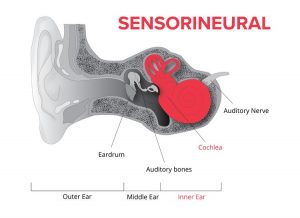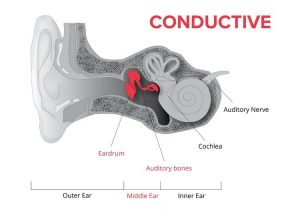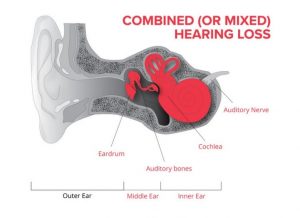Types of Hearing Loss
Sensorineural Hearing Loss
Sensorineural hearing loss, or SNHL, is the result of damage to the hair cells located in the inner ear (cochlea). Soft sounds may be hard to hear. Even louder sounds may be unclear or may sound muffled.
SNHL is the most common type of HL. SNHL is a progressive disorder which in most cases is not treatable with medication or surgery. Most patients with SNHL benefit significantly with hearing aids.
Causes of Sensorineural Hearing Loss
This type of hearing loss can be caused by the following things:
- Aging (Presbycusis)
- Noise Exposure
- Hereditary Issues
- Certain Medications (ototoxicity)
- Congenital problems
- Head trauma
- Increased risk associated with certain medical conditions e.g. diabetes and cardiovascular issues.
Conductive Hearing Loss
A conductive HL is the result of problems that interfere with the transmission of sound through the ear canal, eardrum or middle ear space.
Conductive hearing loss is often treatable with medication or surgical procedures.
Causes of Conductive Hearing Loss
This type of hearing loss can be caused by the following:
- Fluid in your middle ear
- Ear infection, or otitis media.
- Poor Eustachian tube function. The Eustachian tube connects your middle ear and your nose. Fluid in the middle ear can drain out through this tube. Fluid can stay in the middle ear if the tube does not work correctly.
- Perforation (hole) in your eardrum.
- Benign growths in middle ear. Often seen in surfers or individuals routinely exposed to cold water.
- Earwax (cerumen) blocking the ear canal.
- Infection in the ear canal, called external otitis. You may hear this called swimmer’s ear.
- Foreign body in ear canal. An example might be if your child put a pebble in his ear when playing outside.
A problem with how the outer or middle ear is formed. Some people are born without an outer ear. Some may have a deformed ear canal or have a problem with the bones in their middle ear.
Mixed Hearing Loss
Sometimes, a conductive hearing loss happens at the same time as a sensorineural HL, or SNHL. This means that there may be damage in the outer or middle ear and in the inner ear or nerve pathway to the brain. This is a mixed hearing loss.
Causes of Mixed Hearing Loss
Anything that causes a conductive hearing loss or SNHL can lead to a mixed hearing loss. An example would be if you have loss because you work around loud noises and you have fluid in your middle ear. The two together might make your hearing worse than it would be with only one problem.
Hearing Loss Facts
-
48 million individuals in the United States have some form of hearing loss
People are oftentimes surprised by this number, and they should be—this is 20 percent of the total US population! Expressed a different way, on average, one out of every five individuals you encounter will have some degree of difficulty hearing.
-
More than 30 million Americans younger than 65 have hearing loss
Out of the 48 million individuals that have HL in the US, it’s common to presume that the majority are 65 and older.
But the truth is the reverse.
For those troubled with HL in the US, approximately 62 percent are younger than 65.
-
1 billion teens and young adults are in danger of developing hearing loss worldwide
As reported by The World Health Organization:
“Some 1.1 billion teenagers and young adults are at risk of hearing loss due to the unsafe use of personal audio devices, including smartphones, and exposure to damaging levels of sound at noisy entertainment venues such as nightclubs, bars and sporting events. Hearing loss has potentially devastating consequences for physical and mental health, education and employment.”
-
Any sound in excess of 85 decibels can cause damage to hearing
A typical conversation is about 60 decibels and city traffic is around 85 decibels. These sounds probably won’t damage your hearing.
Motorcycles, on the other hand, can reach 100 decibels, power saws can reach 110 decibels, and a rowdy rock concert can achieve 115 decibels. Teenagers also tend to listen to their iPods or MP3 players at around 100 decibels or higher.
-
26 million individuals between the ages of 20 and 69 are afflicted by noise-induced hearing loss
According to the National Institute on Deafness and Other Communication Disorders (NIDCD), 15 percent of Americans (26 million people) between the ages of 20 and 69 suffer from HL as the result of exposure to loud noise.
So, while growing old and genetics can cause hearing loss in older adults, noise-induced hearing loss is equally, if not more, dangerous.
-
Each person’s hearing loss is unique
No two people have exactly the same hearing loss: we all hear an assortment of sounds and frequencies in a somewhat different way.
That’s why it’s crucial to have your hearing examined by a highly trained hearing care professional. Without specialized testing, any hearing aids or amplification products you buy will most likely not amplify the proper frequencies.
-
On average, people wait 5 to 7 years before seeking help for their hearing loss
Five to seven years is a very long time to have to battle with your hearing loss.
Why do people wait so long? There are in fact several reasons, but the main reasons are:
- Less than 16 percent of family doctors test for HL.
- HL is so gradual that it’s hard to notice.
- HL is often partial, which means some sounds can be heard normally, creating the impression of healthy hearing.
People believe that hearing aids don’t work, which brings us to the next fact.
-
Only 1 out of 5 people who could reap the benefits of hearing aids wears them
For every five people who could live better with hearing aids, only one will actually wear them. The main explanation for the disparity is the incorrect presumption that hearing aids don’t work.
Perhaps this was true 10 to 15 years ago, but most certainly not today.
The evidence for hearing aid effectiveness has been thoroughly reported. One example is a study managed by the Journal of the American Medical Association, which found three popular hearing aid models to “provide significant benefit in quiet and noisy listening situations.”
-
More than 200 medications can trigger hearing loss
Here’s a little-known fact: certain medications can injure the ear, resulting in hearing loss, ringing in the ear, or balance disorders. These medications are considered ototoxic.
In fact, there are more than 200 known ototoxic medications. For more information on the specific medications, visit the American Speech-Language-Hearing Association.
-
Professional musicians are 57 percent more likely to suffer from tinnitus
In one of the most extensive studies ever carried out on hearing disorders affiliated with musicians, researchers discovered that musicians are 57 percent more likely to be affected by tinnitus—persistent ringing in the ears—as a result of their work.
If you’re a musician, or if you attend live events, protecting your ears is vital. Talk to us about customized musicians earplugs that ensure both protected listening and preserved sound quality.
Source: https://www.hahc.net/10-surprising-facts-about-hearing-loss/
Learn from our blog!
“How Do You Decide Which Hearing Aid Is Best For Me?”
There are six major hearing aid manufacturers, and they all make quality products. Each manufacturer approaches how they process sound slightly differently in terms of how they manage background noise, adapt for the environment and process speech. They also all have...
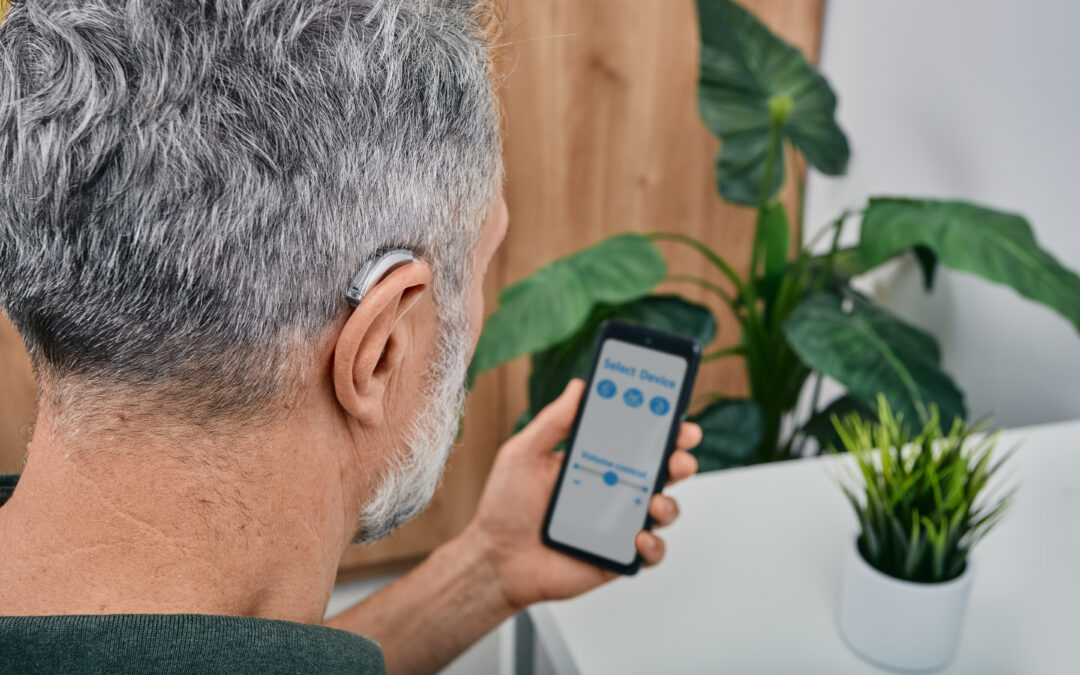
We Now Have OTC Hearing Aids!
You can now find over the counter “OTC” hearing aids on our website or at any one of our three locations. Click HERE to check them out! Why did we choose to sell OTC hearing aids now? After we did a lot of research, we felt comfortable offering the Sennheiser All Day...

“HOW LONG SHOULD MY HEARING AIDS LAST?”
The life of your hearing aids is based on a few things. First is the age of the devices. The older the hearing aids are the more outdated the technology. Hearing aid manufacturers usually improve technology in some way every year. These changes usually include an...

Importance of Wearing Hearing Protection
More than one in ten Americans suffer from hearing problems, and a large percentage of this statistic is related to exposure over overly loud sounds. Hearing loss as a result of noise exposure is preventable through the use of hearing protection. Hearing loss can...
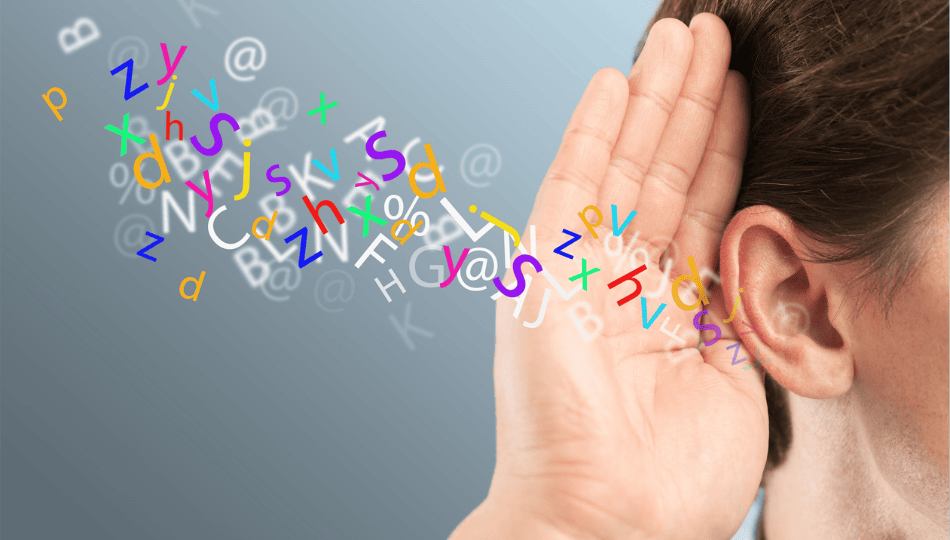
The Link between the Brain and Auditory Processing Disorders
Auditory processing is what your brain does with the information and how it interprets the information. The focus of the brain is to make sense of the received information-essentially how to process it. Processing information involves many tasks which include...

The Correlation Between Imbalance and Age-Related Hearing Loss
Falls are a common problem with adults 65 years and older. One third of the elderly will fall annually, costing approximately 34 billion dollars to cover medical expenses for procedures and hospitalization. Falls also lead to a decrease in the overall quality of life...

